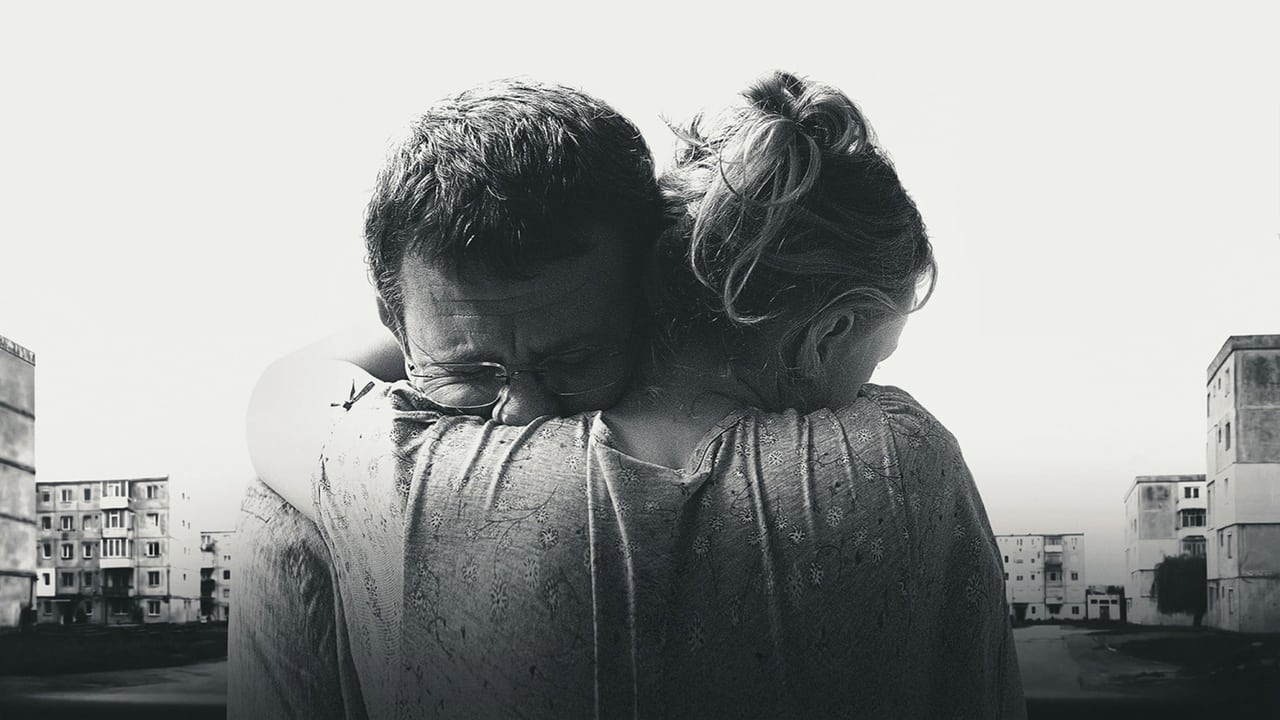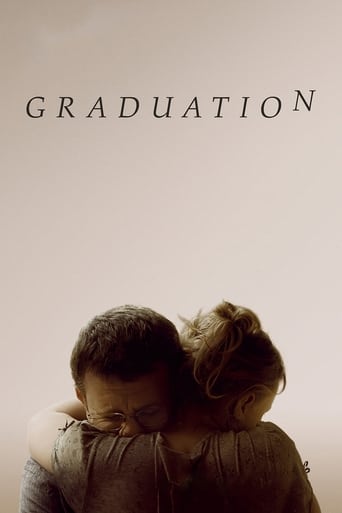Smartorhypo
Highly Overrated But Still Good
FirstWitch
A movie that not only functions as a solid scarefest but a razor-sharp satire.
Alistair Olson
After playing with our expectations, this turns out to be a very different sort of film.
Delight
Yes, absolutely, there is fun to be had, as well as many, many things to go boom, all amid an atmospheric urban jungle.
marsanobill
It's probably better to wait for Netflix on this, a pretty good—but not THAT good—film set in the post-Ceaușescu era, where Eliza is about to realize the dream of her parents: escape from gritty, grubby, backward Romania to a real future in civilized England. She has tentatively won a college scholarship there and needs only to pass her upcoming high-school final to confirm it, but a shattering sexual assault has left her in no condition to take the test, let alone focus sufficiently to pass it. School bureaucrats' refusal to allow a postponement means the scholarship could be lost. The only solution lies in the sordid game of cronyism, bribes, favors and under-table, back-scratch deals that has long been a necessary coping mechanism for people under repressive regimes. Thus the moral crisis for Eliza's father: he's a surgeon, not only good but honest. He won't take bribes, favors and gifts for doing his job (people think he's joking when he refuses their 'incentive money'), but can he, this one time, in these extreme circumstances, dirty his hands just a little to save his daughter's future?
Paul Allaer
"Bacalaureat" (2016 release from Romania; 128 min; US title "Graduation") brings the story of Dr. Aldea and his daughter Eliza. As the movie opens, some throws a stone at the window of the Aldea apartment. We have no idea why. We then get to know Dr. Aldea and Eliza (Aldea's wife Magda remains in the background due to real or perceived illness). Eliza is about to graduate and she already has two offers from great UK universities (with a full scholarship). All that stands between her and the UK are her last finals, where she needs to average a 9 out of 10 to be eligible for the scholarships. Then, one day before the first final, Eliza is assaulted during an attempted rape attack. That obviously overwhelms Eliza, and even though she is in no state to sit for the final, her dad insists that she does anyway. She only scores an 8. At this point we're 15 min, into the movie, but to tell you more of the plot would ruin your viewing experience, you'll just have to see how it all plays out.Couple of comments: this is the latest project from Romanian writer-director Cristian Mungiu, best known for "4 Months, 3 Weeks, 2 Days", but truth be told, that guy seemingly can do no wrong (in my book at least). Here, Mungiu brings yet another morality story set in your average Romanian environment. A middle-class doctor in a small city (Cluj) is looking out for his daughter's best interest, and his whole life is focused on giving Eliza the opportunity to escape Romania and start a new life in England. When not everything goes to plan, the doctor faces a moral dilemma: to try and influence the result, something that goes against everything he stands for and has taught Eliza, or do nothing and risk losing Eliza's opportunity to study in England. The movie approaches this dilemma in a nuanced way, and there is no easy "black or white" answer or solution. Along the way we get to know a number of secondary (but important) characters, including Eliza's boyfriend, the doctor's lover, and others. The acting performances are top-notch throughout, but none more so than Adrian Titieni (who won the Best Actor award at last year's Canned Film Festival, where the movie premiered).The movie finally arrived at my local art-house theater here in Cincinnati last weekend, and I couldn't wait to see it. The Sunday early evening screening was attended nicely, I am happy to report. That sad, given the overall tone of the movie, I can't see this playing in theaters very long, unfortunately. If you are up for another top-notch film from one of the best European directors these days, you cannot got wrong with this. "Bacalaureat" is HIGHLY RECOMMENDED!
JvH48
Seen at the Film Fest Ghent 2016 (website: filmfestival.be/en). In the last four years, I've seen several depressing movies about corruption in former Communist countries. It seems a popular topic in the area, as can be readily derived from noteworthy examples like Durak/The Fool (Bykov 2014), Dolgaya Schastlivaya Zhizn/A Long And Happy Life (Khlebnikov 2013), and Leviathan (Zvyagintsev 2014). Even though the movie at hand follows suit on the same path, it however winds up being not that depressing as the others. Especially the final scenes brought some silver lining for the country's future, albeit that I'm not so sure it is the actual message that the film makers try to drive home.Anyway, the running time is more than 2 hours, but I could not spot any boring or redundant scene. Everything included in the script was necessary and useful, emphasizing how convoluted the tangled web became as woven by the various protagonists. It made abundantly clear that one step causes the next step, and so on and so on, until the point that no backpedaling is possible anymore. In other words, the original policy of our lead character Romeo may not have brought him wealth or influence in the past, yet his route was straightforward and devoid of complex deals deserving counter deals to make the circle round.The threesome family seemed a happy family from the outset, which proved gradually untrue in small steps. The case was not that their problems were unnatural or far-fetched, therefore it took its time for the cracks to become visible. Progress developed slowly but steadily. It was a surprise, for me that is, that there was some sort of resolution in the end. It countered the assumed morale of this movie (my assumption), that there is no middle road in corruption: either one steers clear of it, or one gets involved in complex arrangements from which one cannot get loose once started.All in all, two hours well spent while watching my favorite theme develop on screen, at the same time asking myself what I should have done in similar circumstances. Such thought provoking plots are very welcome, mostly also carrying an existential takeaway message hidden under an exercise for the viewer. We were taught that Honesty Is The Best Policy, but the plot of this movie lets you get doubts underway.
Amari-Sali
Noted Actor(s)Romeo (Adrian Titieni) | Eliza (Maria-Victoria Dragus)Characters & StorylineFrom the way Dr. Romeo paints Romania, you could understand why he would want his daughter Eliza to go to school as far away as the UK. He makes it seem riddled with corruption and criminals roaming the streets, a place he should have never returned to but he thought he could change it. So with all that in mind, he is willing to do whatever it takes so when Eliza takes her final exams, her pending scholarship to a prestigious UK university will be paid for and guaranteed. However, the world he fears the corruption of gets to her before she can escape.HighlightsFor The Sake of the Children vs. The Sake of the CountryOne of the things I found interesting within this movie, though sadly isn't a strong focus, is the idea of whether it is best to send your children to a foreign country to learn and plant roots vs. them perhaps getting a foreign education and returning home with that knowledge. The reason this was of interest is because Romeo really paints Romania as a terrible place. Yet his mother asks, why would you push her to leave and never return? If girls like her don't return, what hopes are there for the country to become better? An idea which, with Donald Trump soon to be the President of the USA, is an interesting one. For many have threatened, though likely not have followed through, to immigrate to different countries to avoid the consequences of his presidency. Yet, relating to this movie, if those who seem capable of creating change or at least crafting hope leave and never return, what does that mean for a country's future?This topic, unfortunately, is mentioned only a handful of times and isn't made anything which most may find noteworthy. However, in a sea of one mundane moment to the next, it was perhaps the one intriguing thought this movie presented.CriticismFrom The Assault, Affair, and Corruption, Everything Is MundaneIt's very weird when a person is assaulted, borderline raped, there is an affair in a movie, and there is a slew of corruption and even an investigation into it, yet there isn't one thing which can be considered exciting. Each character, and perhaps the story itself, almost seems like it is downplaying all of these events. The assault isn't treated as something huge, just a hindrance to Eliza getting the grades she needs to guarantee her getting into university. The affair plot is all but accepted and with neither woman involved happy, nor you understanding how and why they fell in love with Romeo, again there isn't something to really get and keep your attention.Leaving the political corruption. As Romeo tries to figure out a way to give his daughter an edge, he deals with a customs agent, introduced by a police chief, who wants a liver for a favor. Leading to the test administrator being involved and while this all may be a minor scandal, a doctor pushing for an official to get a liver to help his daughter get high marks on a test, everything is handled without a hint of sensationalism, enthusiasm, or anything to snag your attention. Which if this movie was simply an hour, maybe even an hour and a half, that would be unfortunate. But with it being two hours long and none of these usually interesting or at least devastating to watch topics being of interest, that is a damn shame.On The FenceThere Aren't Any Bad Performances, Per seIt's kind of weird to say in a movie so dull there aren't bad performances. To me, I'm just so used to someone taking the lead, being passionate, conniving, or even comical. Yet, like Loving, in some ways, no one tries to step forward and stand out. For even if Romeo has the most scenes, the writing and performance doesn't make him seem like what you'd expect from a lead actor. If anything, he more so seems like he is part of an ensemble and is just taking on more of the movie's focus due to one of the other actors being sick, having schedule conflicts, or simply being unreliable.Overall: Negative (Skip It)As noted, across many a review, passionate performances, troubled or worrisome childhoods, comedic moments, that is what I live for. That, nine times out of ten, is what excites me no matter if it is a book, movie, TV show, video game, or a theatrical production. Yet, despite this movie having many elements of what usually leads to good performances and an entertaining experience, it falls short. It falls off a cliff actually. However, it doesn't necessarily seem bad. It is just that the movie takes a path not often tread and the lack of emotion, someone with charisma, and no one who really snags you makes it hard to be faithful to a two-hour movie. So, while I want to say this is something which is Mixed, I have to give it a negative rating.

